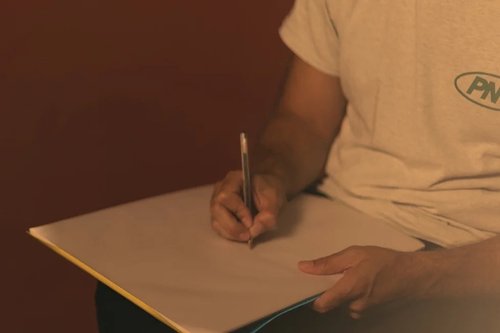The pros and cons of telling friends and family about your job interview
Feb 01, 2022
5 mins


Journalist
Great news—you’ve got that job interview you’ve been waiting for. Now, who do you call first? Your best friend? Your parents? Or no one at all?
When sharing news about a potential new job you can face a mix of reactions: delight from friends, concern from parents, or a partner who doesn’t want to talk about anything else.
Amid the highs and lows of job hunting, some of these reactions can be helpful, but others might lead to extra stress or unnecessary questions. We spoke to Margaret Buj, a talent acquisition specialist and founder of Interview Coach, about the pros and cons of talking through your interview with loved ones. So what’s the best way to share information about your job search?
The pros
Sharing positivity
Interviews can be nerve-wracking. When you’re feeling the pressure, support from your loved ones can help you stay positive throughout the interview process. “Your family and friends want what’s best for you, right? They will be happy for you and cheering you on,” Buj says.
Sometimes, when we’re faced with a challenge, we need our loved ones to remind us of our best qualities. They can boost our energy for the steps ahead. If sharing the news means a much-needed burst of good vibes from your nearest and dearest, just do it. “If it makes you feel better, why not?” Buj says.
Getting advice
Who better to ask for advice than the people who have your best interests at heart? There are all sorts of unknowns around job interviews and those who know you best might have good ideas on how to tackle problems—particularly if they have faced similar issues themselves. It might feel easier to ask friends for advice on sensitive issues such as explaining gaps in a resume, handling salary expectations or finding positive ways to describe past experiences.
Some people in your circle might be especially helpful. “If you know someone who’s either working in recruitment or in a professional business environment, it’s great to get their advice and support. If they are hiring people themselves, they could be a great person to ask,” Buj says.
Helping you prepare
Being prepped for an interview is half the battle, and having someone to help means you can tackle the subject from all angles.
A family member who works in a new field you are interviewing for might be able to fill you in on key issues you wouldn’t otherwise know about. Or maybe a friend can help you pick out the perfect interview outfit so you look and feel like you belong as soon as you walk in.
Interview preparation doesn’t have to be specific to the job. “Your loved ones can potentially even do a mock interview with you just to run through the questions, give you feedback on how you’ve answered them or on your body language and eye contact,” says Buj.
Getting a different—trusted—perspective is sure to help you feel more confident when the day of your interview arrives.
The cons
Dealing with negative comments
Even if our family and friends want what’s best for us, they might not always show it in ways we find useful. Job hunting and interviewing are times of professional uncertainty, when negative feedback from loved ones can sting more than usual. Dealing with other people’s doubts about your decisions can be demotivating, says Buj, at a time when you need to stay focused and optimistic.
“That’s the last thing you want when you’re looking for a job,” she says. “If you know someone is typically quite negative, then I’d try to avoid telling them about your interview.”
Fielding bad advice
As well as opinions—positive and negative—it is likely that your loved ones will want to offer advice for your interview. This might be well intentioned but, as Buj says, “The problem is, your relatives may not have any clue about your job search.”
Getting bad advice from people you trust can leave you feeling muddled and sow doubts about what you’re aiming for, as Buj knows from her own job searches. “Personally, it stressed me out when people tried to give me advice on things they were not qualified in. They didn’t know the market at all, but people were telling me, ‘Maybe you’re being too picky.’”
Depending on your social circle, you may know the most about the sector, company or job you’re applying for, in which case it might be best just to trust your own instincts. Buj has a simple rule for deciding who to ask for help when preparing for an interview: “Don’t take advice from people who haven’t done what you’re looking to do.”
Pressure to share the result
Finding out you’ve got a sought-after interview can feel joyful, and naturally you want to tell people who will share in your happiness. But doing so sets up an expectation that you will also share news about the rest of the process. “You’re going to be putting too much pressure on yourself because everyone will be asking you how the interview went,” Buj says.
Even if your interview goes well, it can be hard to know what is really going on behind closed doors. “It might be that the job will get put on hold or there will be a last-minute candidate who’s even stronger. The offer is never guaranteed until you’ve signed the contract,” says Buj.
How to navigate talking to your loved ones about the interview process
Choose who you tell
Buj advises sharing the news with a select group of people you know will support you, whatever the outcome of the interview. “Of course, you can mention it to your spouse or one or two close friends, but I definitely would not be sharing it with everyone,” she says.
If you feel the need to share the news more widely, or someone else does this for you, keep the information out there to a minimum. “There’s nothing wrong with mentioning something, but I wouldn’t be updating everyone every five minutes or every day,” says Buj. “Just give a brief update that you’re interviewing and you’ll let them know how it goes.”
Draw your boundaries
What if you’ve shared the news with someone and then wish you hadn’t? At this point, you need to start drawing boundaries or risk their opinions clouding your judgment and affecting your interview.
Buj suggests being gracious but making it clear that you do not want to talk about the interview process any more. “I would just say, ‘Thank you so much for your support. I really appreciate you being here for me. However, I’m feeling a little bit overwhelmed. I have a few interviews and I will update you when I have a role,’” she says.
Defining your boundaries sooner rather than later is especially important as interviewing can be a lengthy process. Some companies ask candidates to go through multiple interviews and tests, and if you are interviewing with more than one, it could easily take a few months to hear back from each.
Think about when to share
While loved ones can support you through the interview process, your wider circle might be most helpful before you even get this far in your job search. “Friends and family can be a great way to hear about job opportunities and to make connections with hiring companies,” Buj says. If you’re thinking about looking for a job, former colleagues, friends and associates can all help you investigate new roles and meet new people.
Sharing your career plans earlier rather than later is also less pressured than sharing when you have an important interview coming up.
Otherwise, Buj advises keeping news about interviews as quiet as possible. “Honestly, I think it is best not to share until you actually have a role,” she says. At that point, the good news is confirmed and all that’s left for your friends and family to do is celebrate with you.
Photo: Welcome to the Jungle
Follow Welcome to the Jungle on Facebook, LinkedIn, and Instagram, and subscribe to our newsletter to get our latest articles every day!

More inspiration: Prepare for a job interview

Hybrid work goals: How to nail the negotiation in your next job interview
Want a hybrid work setup? Learn how to research, negotiate, and showcase the benefits of flexibility during your next job interview.
Dec 19, 2024

The secret to interview success? That annoying colleague
Got a story about a difficult coworker? Good! That office drama might just be your ticket to acing your next interview.
Dec 16, 2024

Is flexibility the key to “having it all” as a parent?
Balancing a career and parenthood can be challenging, but with the right approach, it’s possible to achieve both.
Oct 08, 2024

Slacker vs. control freak: What’s your interview style?
We’ve all been there: whether you're overly anxious or effortlessly cool—what best describes you?
Sep 24, 2024

Overcoming neurotypical norms during the job hunt
Neurodiverse individuals bring valuable innovation and should be more included in the workplace. How can we embrace their unique talents?
Sep 23, 2024
The newsletter that does the job
Want to keep up with the latest articles? Twice a week you can receive stories, jobs, and tips in your inbox.

Looking for your next job?
Over 200,000 people have found a job with Welcome to the Jungle.
Explore jobs